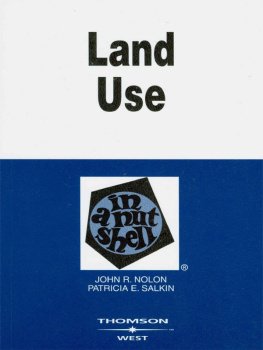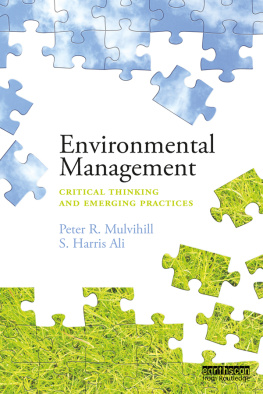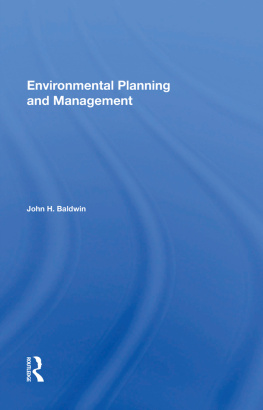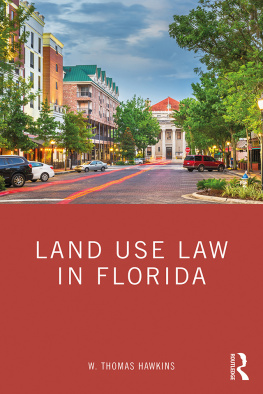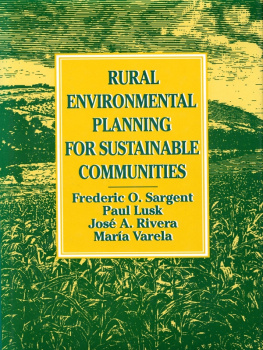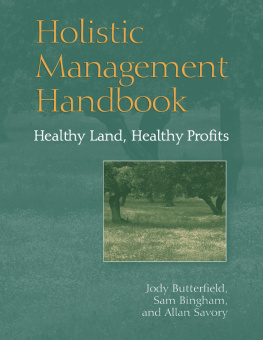John Randolph - Environmental Land Use Planning and Management
Here you can read online John Randolph - Environmental Land Use Planning and Management full text of the book (entire story) in english for free. Download pdf and epub, get meaning, cover and reviews about this ebook. year: 2012, publisher: Island Press, genre: Politics. Description of the work, (preface) as well as reviews are available. Best literature library LitArk.com created for fans of good reading and offers a wide selection of genres:
Romance novel
Science fiction
Adventure
Detective
Science
History
Home and family
Prose
Art
Politics
Computer
Non-fiction
Religion
Business
Children
Humor
Choose a favorite category and find really read worthwhile books. Enjoy immersion in the world of imagination, feel the emotions of the characters or learn something new for yourself, make an fascinating discovery.
- Book:Environmental Land Use Planning and Management
- Author:
- Publisher:Island Press
- Genre:
- Year:2012
- Rating:5 / 5
- Favourites:Add to favourites
- Your mark:
- 100
- 1
- 2
- 3
- 4
- 5
Environmental Land Use Planning and Management: summary, description and annotation
We offer to read an annotation, description, summary or preface (depends on what the author of the book "Environmental Land Use Planning and Management" wrote himself). If you haven't found the necessary information about the book — write in the comments, we will try to find it.
John Randolph: author's other books
Who wrote Environmental Land Use Planning and Management? Find out the surname, the name of the author of the book and a list of all author's works by series.
Environmental Land Use Planning and Management — read online for free the complete book (whole text) full work
Below is the text of the book, divided by pages. System saving the place of the last page read, allows you to conveniently read the book "Environmental Land Use Planning and Management" online for free, without having to search again every time where you left off. Put a bookmark, and you can go to the page where you finished reading at any time.
Font size:
Interval:
Bookmark:
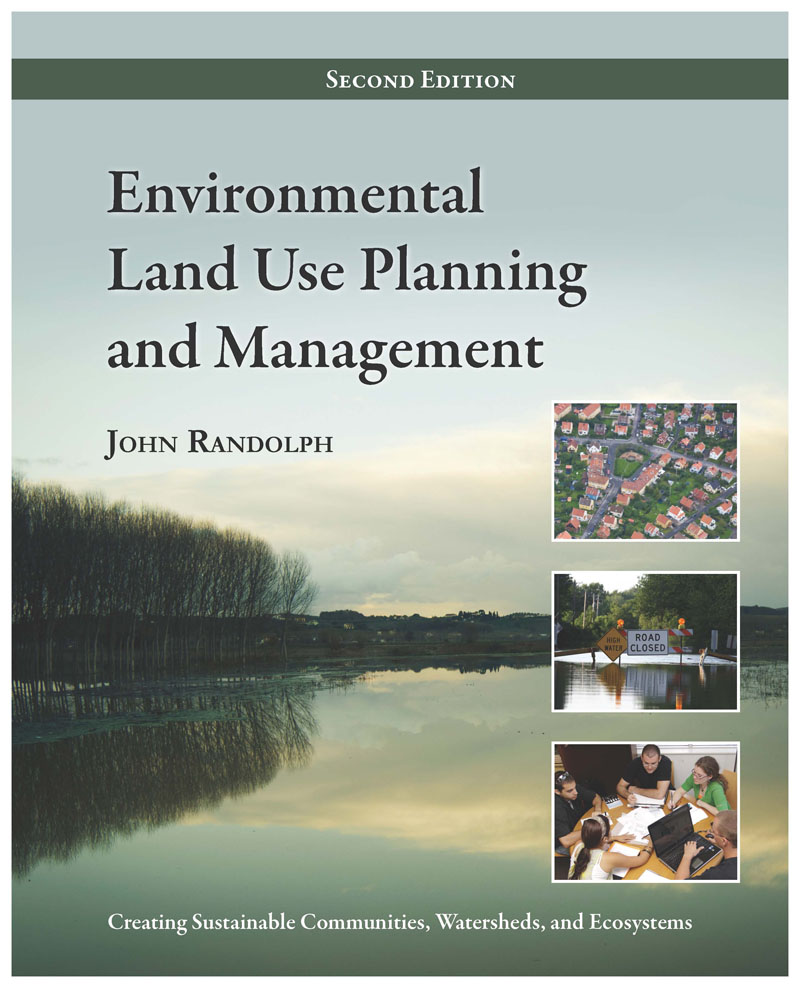
About Island Press
Since 1984, the nonprofit Island Press has been stimulating, shaping, and communicating the ideas that are essential for solving environmental problems worldwide. With more than 800 titles in print and some 40 new releases each year, we are the nations leading publisher on environmental issues. We identify innovative thinkers and emerging trends in the environmental field. We work with world-renowned experts and authors to develop cross-disciplinary solutions to environmental challenges.
Island Press designs and implements coordinated book publication campaigns in order to communicate our critical messages in print, in person, and online using the latest technologies, programs, and the media. Our goal: to reach targeted audiencesscientists, policymakers, environmental advocates, the media, and concerned citizenswho can and will take action to protect the plants and animals that enrich our world, the ecosystems we need to survive, the water we drink, and the air we breathe.
Island Press gratefully acknowledges the support of its work by the Agua Fund, Inc., Annenberg Foundation, The Christensen Fund, The Nathan Cummings Foundation, The Geraldine R. Dodge Foundation, Doris Duke Charitable Foundation, The Educational Foundation of America, Betsy and Jesse Fink Foundation, The William and Flora Hewlett Foundation, The Kendeda Fund, The Andrew W. Mellon Foundation, The Curtis and Edith Munson Foundation, Oak Foundation, The Overbrook Foundation, the David and Lucile Packard Foundation, The Summit Fund of Washington, Trust for Architectural Easements, Wallace Global Fund, The Winslow Foundation, and other generous donors.
The opinions expressed in this book are those of the author(s) and do not necessarily reflect the views of our donors.

Island Press mission is to provide the best ideas and information to those seeking to understand and protect the environment and create solutions to its complex problems. Join our newsletter to get the latest news on authors, events, and free book giveaways. Click here to join now!

Copyright 2004, 2012 by John Randolph
All rights reserved under International and Pan-American Copyright Conventions. No part of this book may be reproduced in any form or by any means without permission in writing from the publisher: Island Press, Suite 300, 1718 Connecticut Ave., NW, Washington, DC 20009.
Island Press is a trademark of The Center for Resource Economics.
Library of Congress Cataloging-in-Publication Data
Randolph, John.
Environmental land use planning and management / by John Randolph.2nd ed.
p. cm.
Includes bibliographical references and index.
ISBN-13: 978-1-59726-730-4 (cloth : alk. paper)
ISBN-10: 1-59726-730-9 (cloth : alk. paper)
1. Land useEnvironmental aspects. 2. Land usePlanning. I. Title.
HD108.3.R36 2011
333.73dc23 2011026558
British Cataloguing-in-Publication data available.
Printed on recycled, acid-free paper
Manufactured in the United States of America
10 9 8 7 6 5 4 3 2 1
To Sandy
The first edition of this book began with the following words, written in 2003:
For thousands of years we humans have been learning how to manage our relationship with nature. Every generation creates a new set of circumstances as our population and economy grow, as our impacts on the natural environment increase, and as our knowledge of the consequences of our actions and means of controlling them advance. Every generation must adapt to those circumstances. Our evolving social and political system has enhanced our ability to make collective decisions about the use and management of the natural environment, as well as how to adapt to it. Although we face a myriad of environmental and related economic and social challenges, the good news is that we continue to learn.
We have, in fact, continued to learn, and the reason for the second edition of this book is to chronicle what we have learned in the past decade. In our fast-changing world, it does not take a generation for a new set of circumstances to emerge, and we cannot wait a full generation to respond and adapt to them.
We are faced with new environmental challenges, led by climate change and its prospective impacts on water supplies, agriculture, ecosystems, and coastal cities due to sea level rise and increasing incidents of extreme weather events. We are under a climate change imperative that requires mitigating our impact by reducing emissions of greenhouse gases and adapting to the consequences of climate change that are likely to occur despite our mitigation efforts.
In addition to climate change, we are faced with population trends that have resulted in more than half the global population living in cities, with the prospect of 80% by 2050. This is actually good news for natural ecosystems, as urbanization tends to lead to a lower environmental impact per person and drives down fertility rates that should slow population growth to a stable 89 billion by mid-century. The global challenge we face, as Stewart Brand puts it, is to Green the hell out of our growing cities (2009, 69), making them livable and sustainable, reducing their ecological footprint, and providing social and economic opportunities for their growing populations. The second challenge is to protect the newly emptied countryside, its agriculture, forest, and watershed resource lands and its biodiversity and ecological services.
The first edition chronicled emerging approaches to environmental land use planning and management. Providing a framework for teaching and learning interdisciplinary environmental planning, it emphasized land use, land analysis, methods, and policies for planning and managing urban development, as well as rural resource agriculture and forestlands in the United States. These emerging approaches included environmental and community design, environmental engineering and science, information systems, integrative approaches, collaborative processes, land conservation, smart urban growth management, and environmental regulatory and nonregulatory policies and their legal foundation.
The first edition traced the evolution of these approaches, with the assumption that our continuing learning process does (and must) get better to meet emerging challenges. This is no more evident than in the brief span of years that have passed since the first edition was published. Nearly all of these approaches have advanced, and this second edition presents this next generation of environmental planning. The community continues to be the laboratory, where new methods, technologies, designs, and policies are devised, tried, and judged. Therefore, this edition uses more case studies of these approaches in action.
The new edition also has a slight shift in emphasis and includes emerging challenges and responses.
- Sustainable communities. Because of demographic and social trends, more emphasis is placed on urbanization and the growing movement toward sustainable and livable communities. Not only do we see citizens and cities creating this movement, but U.S. federal agencies are focusing on this theme. There are many dimensions to this movement, including energy and climate protection, stormwater management, green infrastructure, public health and active living, mobility, economic vibrancy, affordability, social interaction, community resilience, and environmental justice, among others. They are all interrelated and are all necessary for sustainable communities.
Font size:
Interval:
Bookmark:
Similar books «Environmental Land Use Planning and Management»
Look at similar books to Environmental Land Use Planning and Management. We have selected literature similar in name and meaning in the hope of providing readers with more options to find new, interesting, not yet read works.
Discussion, reviews of the book Environmental Land Use Planning and Management and just readers' own opinions. Leave your comments, write what you think about the work, its meaning or the main characters. Specify what exactly you liked and what you didn't like, and why you think so.



